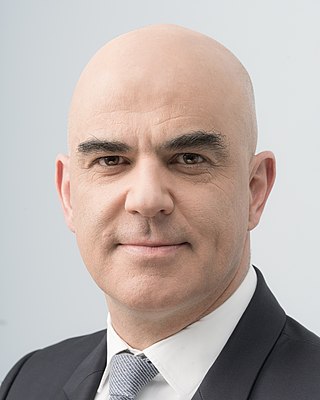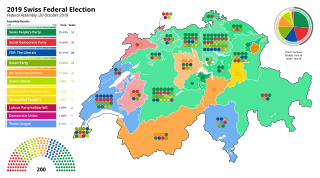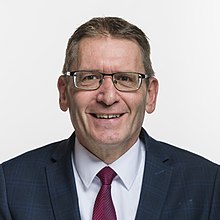
The Federal Council is the federal cabinet of the Swiss Confederation. Its seven members also serve as the collective head of state and government of Switzerland. Since after World War II,the Federal Council is by convention a permanent grand coalition government composed of representatives of the country's major parties and language regions.

The Social Democratic Party of Switzerland,also called the Swiss Socialist Party,is a political party in Switzerland. The SP has had two representatives on the Federal Council since 1960 and received the second-highest number of votes in the 2023 Swiss federal election.

The National Council is the lower house of the Federal Assembly,with the upper house being the Council of States. Containing 200 seats,the National Council is the larger of the two houses.

The Council of States is the upper house of the Federal Assembly of Switzerland,and the lower house being the National Council. It comprises 46 members.

Federal elections were held in Switzerland on 19 October 2003. Although in Switzerland's political system,in which all four major parties form a coalition,it is very difficult to achieve a change of government,this election produced an upset with the strong showing of the right-wing,anti-European Union and anti-immigration Swiss People's Party. The left-wing parties,the Social Democrats and the Greens,also improved their positions. The losers were the parties of the centre and centre-right,the Christian Democratic People's Party and the Free Democratic Party.

The Green Party of Switzerland is a green political party in Switzerland. It is the fifth-largest party in the National Council of Switzerland and the largest party that is not represented on the Federal Council.
Switzerland elects on national level a collective head of state,the Federal Council,and a legislature,the Federal Assembly.

The Federal Assembly is the federal bicameral parliament of Switzerland. It comprises the 200-seat National Council and the 46-seat Council of States. It meets in Bern in the Federal Palace.

Alain Berset is a Swiss politician who served as a Member of the Swiss Federal Council from 2012 to 2023. A member of the Social Democratic Party (SP/PS),he headed the Federal Department of Home Affairs from when he took office. Berset served as President of the Swiss Confederation for 2018 and 2023.
Voting in Switzerland is the process by which Swiss citizens make decisions about governance and elect officials. The history of voting rights in Switzerland mirrors the complexity of the nation itself. The polling stations are opened on Saturdays and Sunday mornings but most people vote by post in advance. At noon on Sunday,voting ends and the results are usually known during the afternoon.

Elections to the Swiss Federal Assembly,the federal parliament of Switzerland,were held on Sunday,21 October 2007. In a few cantons,a second round of the elections to the Council of States was held on 11 November,18 November,and 25 November 2007. For the 48th legislative term of the federal parliament (2007–2011),voters in 26 cantons elected all 200 members of the National Council as well as 43 out of 46 members of the Council of States. The other three members of the Council of States for that term of service were elected at an earlier date.

Karin Keller-Sutter is a Swiss politician who has served as a Member of the Swiss Federal Council since 2019. A member of FDP. The Liberals,she is the head of the Federal Department of Finance. Keller-Sutter previously served as President of the Council of States for the 2017–2018 term,and has served as vice president of Switzerland for the 2024 term since 1 January.
Women in Switzerland gained the right to vote in federal elections after a referendum in February 1971. The first federal vote in which women were able to participate was the 31 October 1971 election of the Federal Assembly. However it was not until a 1990 decision by the Federal Supreme Court of Switzerland that women gained full voting rights in the final Swiss canton of Appenzell Innerrhoden.

Federal elections were held in Switzerland on 18 October 2015 for the National Council and the first round of elections to the Council of States,with runoff elections to the Council of States being held in various cantons until 22 November.

Federal elections were held in Switzerland on 20 October 2019 to elect all members of both houses of the Federal Assembly. This was followed by the 2019 election to the Swiss Federal Council,the federal executive,by the United Federal Assembly.

Federal elections were held in Switzerland on 22 October 2023 to elect all members of the National Council and Council of States. The elections were followed by elections to the Federal Council,Switzerland's government and collegial presidency,on 13 December.












